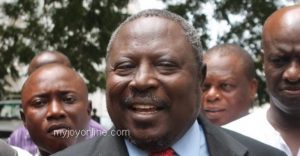 Former Attorney-General Martin ABK Amidu, has praised the work of state attorneys who have been heavily criticised for recommending the discontinuation of the case against eight Delta Force members.
Former Attorney-General Martin ABK Amidu, has praised the work of state attorneys who have been heavily criticised for recommending the discontinuation of the case against eight Delta Force members.
In a statement released Friday, he called their three-page legal opinion ‘exceptional’ and ‘excellent’.
The eight suspects who are members of NPP para-security group Delta Force were arrested and charged with disturbing a court session, for resisting arrest, and freeing 13 persons who were in lawful custody in a raid at the Kumasi Circuit court on April 6.
But at a court hearing last Wednesday, the state dropped the charges based on the advice of its lawyers. The attorneys had said the two police officers who witnessed the incident said they could not identify the culprits.
The dropping of charges has been widely condemned by sections of the public including the official opposition in parliament, the NDC and the government which says it is investigating the development.
The no-evidence explanation has raised suspicions that the governing New Patriotic Party, which prides itself as a party of respect for the rule of law is condoning lawlessness.
The government in its defence has said it was not consulted by the state attorney in Kumasi before discontinuing the case.
The Attorney-General Gloria Akuffo has consequently ordered investigations into the circumstances under which the Senior State Attorney got the suspects discharged for lack of evidence.
Wading into the controversy, Martin Amidu, an anti-graft campaigner who has developed a hobby of offering legal opinions on issues of public interest has defended the state’s lawyers.
He said the state attorneys did not need to consult the Justice minister in carrying out a routine duty of providing their legal advice.
He suggested, the investigation ordered by the Justice minister and Attorney General Gloria Akuffo is unnecessary.
“While the Attorney General may persuade a professional attorney in her department to change his or her view of the law and the evidence based on superior legal reasoning and persuasion, it is professional misconduct on the part of any Attorney General to compel an attorney to doctor his legal opinion to concur with that of the Attorney General.
“What any Attorney General can do when he or she disagrees with the opinion of her professional staff is to recall the docket from the attorney and assign it to another lawyer willing to agree with her or to take over the docket herself and prosecute it”.
THE LEGAL ADVICE ON THE 8 ALLEGED DELTA FORCE MEMBERS IS UNASSAILABLE: BY MARTIN A. B. K. AMIDU
I have had the privilege of reading the legal advice tendered by the Ashanti Regional Office of the Attorney General to the Ghana Police Service, Kumasi, in the case of R v Mensah Azer & 7 Others, popularly known as the 8 Delta Members Case. The advice is exceptional in the manner it states the facts of the case, and the evidence as disclosed upon the perusal of the police docket, and the legal opinion based on the facts and evidence on the docket.
The Ashanti Regional Office of the Attorney General did an excellent job expected of professional prosecuting attorneys in setting forth the legal advice in such a way that anybody wishing to replicate the methodology to find out whether or not the conclusions are valid may do so. As professional lawyers representing the Attorney General they were perfectly within their delegated authority under the constitution and the laws of Ghana to have arrived at the conclusions they did based, as it were, on the docket presented to them by the Ghana Police Service/CID.
Accordingly the conclusion that: “I therefore advise that the charges of DISTURBANCE OF COURT AND RESISTING ARREST & RESCUE against the suspects must be dropped for lack of evidence to prosecute” is unassailable on the facts and the evidence. The offences with which the suspects were charged are not one of those cases in which standing instructions have been given to the regional offices of the Attorney-General to refer dockets to the Head Office for concurrence before the issuance of legal advice to the police. The Ashanti Regional Office was therefore perfectly within the exercise of its prosecutorial discretion to deal with the case without further reference to the Attorney General in Accra.
I have been the only Deputy Attorney General under the PNDC Government, and also the only Deputy Attorney General under the eight year term of the NDC1 & 2 Governments that terminated on 7thJanuary 2001. I was also an Attorney General under the NDC 3 Government for some time. My experience and learning is that the regional offices of the Attorney General’s Department are by convention to be headed by Chief State Attorneys (or such other senior Attorneys as are available having regard to the manpower situation of the department) who exercise and supervise the exercise of the powers of the Attorney General in the region. The prosecutorial powers of the Attorney General are of quasi-judicial nature exercisable in accordance with strict legal principles.
While the Attorney General may persuade a professional attorney in her department to change his or her view of the law and the evidence based on superior legal reasoning and persuasion, it is professional misconduct on the part of any Attorney General to compel an attorney to doctor his legal opinion to concur with that of the Attorney General. What any Attorney General can do when he or she disagrees with the opinion of her professional staff is to recall the docket from the attorney and assign it to another lawyer willing to agree with her or to take over the docket herself and prosecute it.
Consequently, the impression that the regional office of the Attorney General’s Department had to have recourse to the Attorney General simply because the suspects were alleged to be members of the New Patriotic Party is dangerous for our democracy, the rule of law and the prosecutorial discretion delegated by the Attorney General to each of her prosecuting attorneys and particularly her regional representatives. The Chief State Attorney heading the Ashanti Regional office has been the most senior prosecuting attorney in the Attorney General’s office since the retirement of the late Ms. Aikins as the Director of Public Prosecutions during my tenure in 2011 and must have approved the legal advice which is unassailable professionally.
The contention that because a suspected crime involves members of a political party in power the Attorney General must for that reason alone personally see the docket before professional attorneys advise on it is discriminatory against other citizens. This is because political and other considerations may ultimately substitute themselves for legal considerations. National Democratic Congress and New Patriotic Party members must be subject to the same standards of prosecutorial decision making as any ordinary person suspected of the commission of crime.
What the advice proffered by the Ashanti Regional office of the Attorney General demonstrates is the importance of the presumption of innocence. Six of the eight alleged Delta Force members have stated that they are not members of the NPP and did not take part in the alleged crime. Two of the eight admitted that they are NPP members but they were not part of the group that committed the offences for which they were charged. The Complainant was a police officer who was not even present at the scene of the offence. The two police witnesses who made written statements could not identify any of the suspects as a participant in the crime. Is it the fault of the suspects that the police could not produce a better docket implicating them? Not at all!
But the party of national democracy (the NDC) nonetheless wanted the attorneys to have presumed the suspects guilty and charged them for court without any evidence. This is the very attitude of political interference in the constitutional duties of the Attorney General’s office which I fought against during my tenure as the Attorney General under NDC 3. Professional attorneys in the Attorney General’s Department do not manufacture evidence; they act upon the facts and evidence on the police docket.
Re-arresting suspects who have contested their arrest and submitted themselves to the Republic to prove their guilt and against each of whom the Republic lacks evidence to prosecute will be inconsistent with and in contravention of the fundamental rights and freedoms of the citizen and accordingly unconstitutional. What the NDC should be doing is to furnish the police with the evidence, including the video they have to enable the police to build a better docket for prosecution instead of the unconstitutional instruction to re-arrest citizens who have been discharged by a court of law. The invitation to the President, a former Attorney General, to interfere in criminal prosecutions is capricious and unbecoming of the ideals of a national democratic congress.
I am informed that the Attorney General was and is out of the jurisdiction which may explain the hurry to blame the professional attorneys performing their prosecutorial functions in the Ashanti Region. The suspects have only been discharged. Should the Attorney General be of the view that because the suspects are alleged to be NPP members she can find the evidence to prosecute them in spite of the available docket, she has a right to call for the docket and give further directives on them.
But let me say for the purpose of the integrity of the office of the Attorney General that it is professional misconduct on the part of an Attorney General to question the professional judgment and integrity of professional officers simply because they choose to act as lawyers and not politicians. The minority NDC in parliament is acting politically and unconstitutionally in its complaints on this matter. The judiciary understands the presumption of innocence and the fact that only suspects against whom evidence is available may be prosecuted. I hope the Attorney General will act professionally as quasi-judicial officer in exercising the constitutional prosecutorial powers of the Republic by respecting the delegated powers given by her to her professional regional representatives before she finds herself overwhelmed by all the criminal dockets from all the regions seeking for her approval before finalization.
Martin A. B. K. Amidu
(Citizens Vigilance for Justice)
18th May 2017
Story by Ghana|myjoyonline.com




